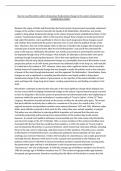How far was Khrushchev able to bring about fundamental change to the system of government
established by Stalin?
Between the reigns of Stalin and Khrushchev the Soviet system of government seemingly underwent
change on the surface, however beneath the façade of de-Stalinisation, Khrushchev was mostly
unable to bring about fundamental change to the system of government established by Stalin. In this
context, ‘fundamental change’ refers to the long term impact these changes to Soviet government
had under Khrushchev, more specifically it refers to how much progression these changes caused
and whether they modernised the party to become more in tune with the political climate of the
time. Therefore, the root of this debate relies on the fact of whether the changes still remained an
essential part of Soviet Government after the end of Khrushchev’s rule and if they reformed the
party in the long run. Ultimately, Khrushchev was mainly unsuccessful in achieving this and this can
be displayed through many of his changes. Most notably, his attempts to democratise inner party
workings through introducing fixed tenures. This is the most significant change to show how
Khrushchev did not bring about fundamental change as is exemplifies how one of Khrushchev’s most
progressive policies to do with Soviet government was ultimately futile in the long run, and ironically
it is what led to his ousting in 1957. However, there were other significant factors which reveal the
limited amount of fundamental change that was brought in under Khrushchev such as the reduction
of power of the state through devolvement, and the supposed ‘De-Stalinisation’. Nevertheless, these
changes are not as significant in revealing how Khrushchev was largely unable to bring about
fundamental change to the system of government, as the rejection of the democratisation of inner
party workings had a huge long-term impact- creating a gerontocracy and fuelling corruption in the
state.
Khrushchev’s attempts to democratise the party is the most significant change which displays how
he was unsuccessful in bringing fundamental change to the system of government because it proved
to have no longevity in the Soviet system of government and unfortunately led to the heightening of
autocracy within the party due to Brezhnev’s counter-policy of ‘Trust in Cadres’. At the 22 nd Party
Congress, Khrushchev introduced limits on the tenure of office for all senior party posts. This meant
that party officials could only stay in office for a maximum of 16 years. As a result of this, 2/3 of
regional secretaries and presidium members were replaced between 1957 and 1961. Whereas under
Stalin, party officials remained in their posts for life, unless they were sacked, expelled, or purged.
This policy was very effective in reducing political stagnation as it ensured that the party was
constantly progressing and becoming more representative of the modern-day Soviet society.
However, it caused much political turbulence and essentially was the main reason why Khrushchev
was forced to resign on the 14th of October 1964, as many members of the central committee were
frustrated with the fact that they could lose their positions. In 1965, the policy of ‘Trust in Cadres’
was introduced by Khrushchev’s successor Brezhnev, which meant that most party officials, including
those at the top, were to enjoy long, unbroken tenures in their positions. This policy was a counter
to Khrushchev’s limited fixed tenures, revealing how quickly the democratisation of inner party
workings was reversed. Moreover, it led to the formation of a Gerontocracy and a static government
inevitably formed. Between 1964 and 1971 only 2 people were promoted to the Politburo and
between 1966 and 1971 80-90% of Central Committee members retained their jobs. Consequently,
the government aged and that is why Brezhnev’s style of government was nicknamed a
‘Gerontocracy’: the rule of old people. In 1966 the average age of Politburo members was 58 and in
1982 the average age of Politburo members was 75. This created a huge generation gap between
the people and government, therefore revealing that the efforts of Khrushchev to ensure that the




